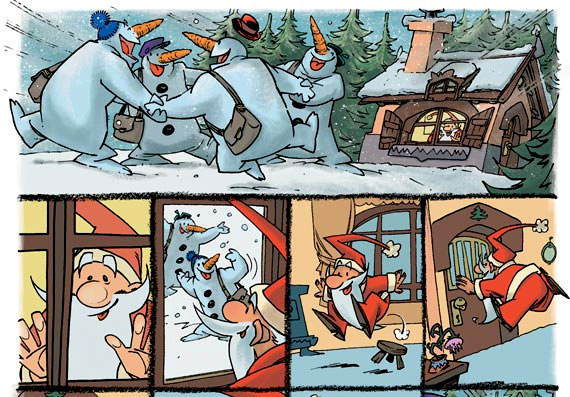Thierry Robin is a French comic author, born in Damery, La Marne. He studied at the School of Fine Arts in Reims, where he specialized in animation. Robin published his first illustrations and comics in the Fleurus magazines Triolo and Mikado, and also worked in the field of advertising for clients like La Poste. His early works already show the author's fascination for China, while Belgian Art Nouveau, silent movies and mythology have later also served as sources for inspiration.
'Crève le Malin' was Robin's first album, published by Rackham in 1990 and nominated at the Angoulême comic festival. Between 1991 and 1996, he worked for Delcourt on the poetic series 'Rouge de Chine', that was heavily inspired by his trips to China and Tibet. Robin co-founded the Atelier Entropie with Stéphane Servain, Pierre-Yves Gabrion and Bertrand Antigny in 1995.
In 1997, he collaborated with Yann on the collective album 'Sales Petits Contes' for Dupuis' Humour Libre collection. A year later, he created the humorous and poetic 'La Teigne' in the collection Tohu-Bohu of Les Humanoïdes Associés. In 1999 he launched the fantasy series 'Koblenz' at Delcourt, in which he experimented with Art Nouveau graphics and historical settings, resulting from a two-year stay in Brussels.
Le Petit Père Noël
Between 2000 and 2004, he also teamed up with Lewis Trondheim to create 'Petit Père Noël', a silent children's comic about Santa Claus, for Spirou magazine. He returned to the Christmas theme in 2007 with 'Le petit monde de Père Noël', another children's series with Alexandre Révérend. He created 'Sex Crimes' together with Jean-Michel Thiriet for Fluide Glacial, and made a children's series called 'Zappa Tika' for Dupuis in 2006 and 2007. He cooperated with scriptwriter Fabien Nury on the political fiction diptych 'La Mort de Staline', that was published by Dargaud in 2010 and 2012. The comic book is a satirical look at Russian dictator Joseph Stalin and all the power struggles caused by his sudden passing in 1953. In 2017 this graphic novel was adapted into film by Armando Iannucci, starring celebrity actors like Steve Buscemi and Michael Palin. The picture received excellent reviews, but was banned in Azerbaijan, Kazachstan, Kyrgyzstan and, naturally, Russia.






